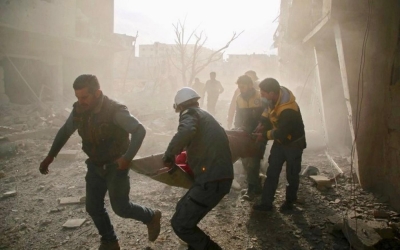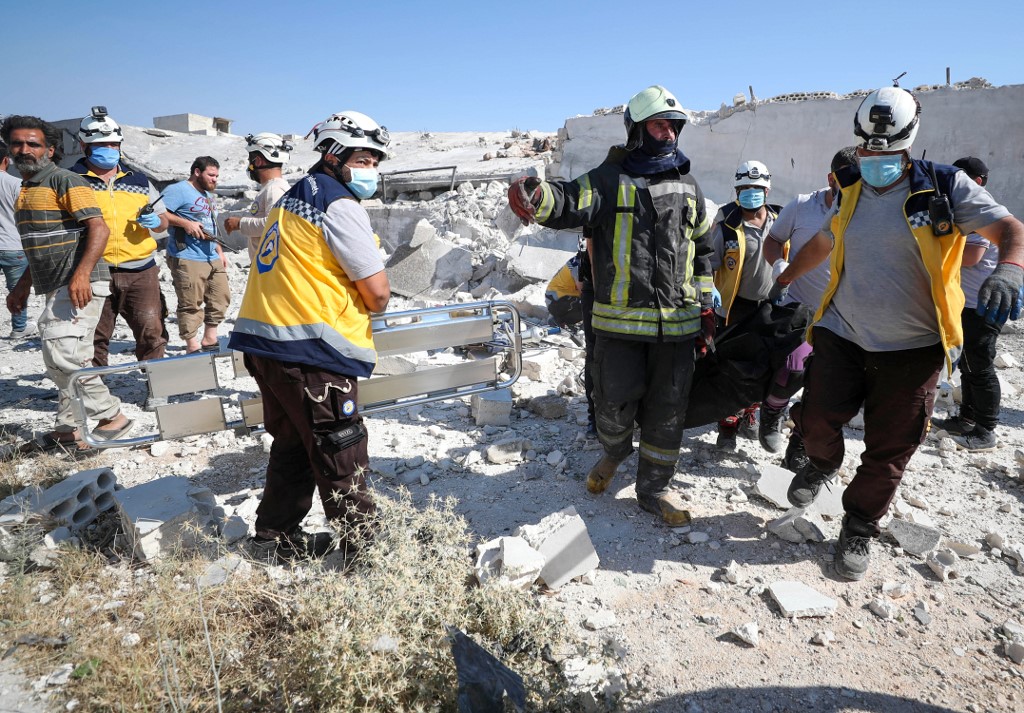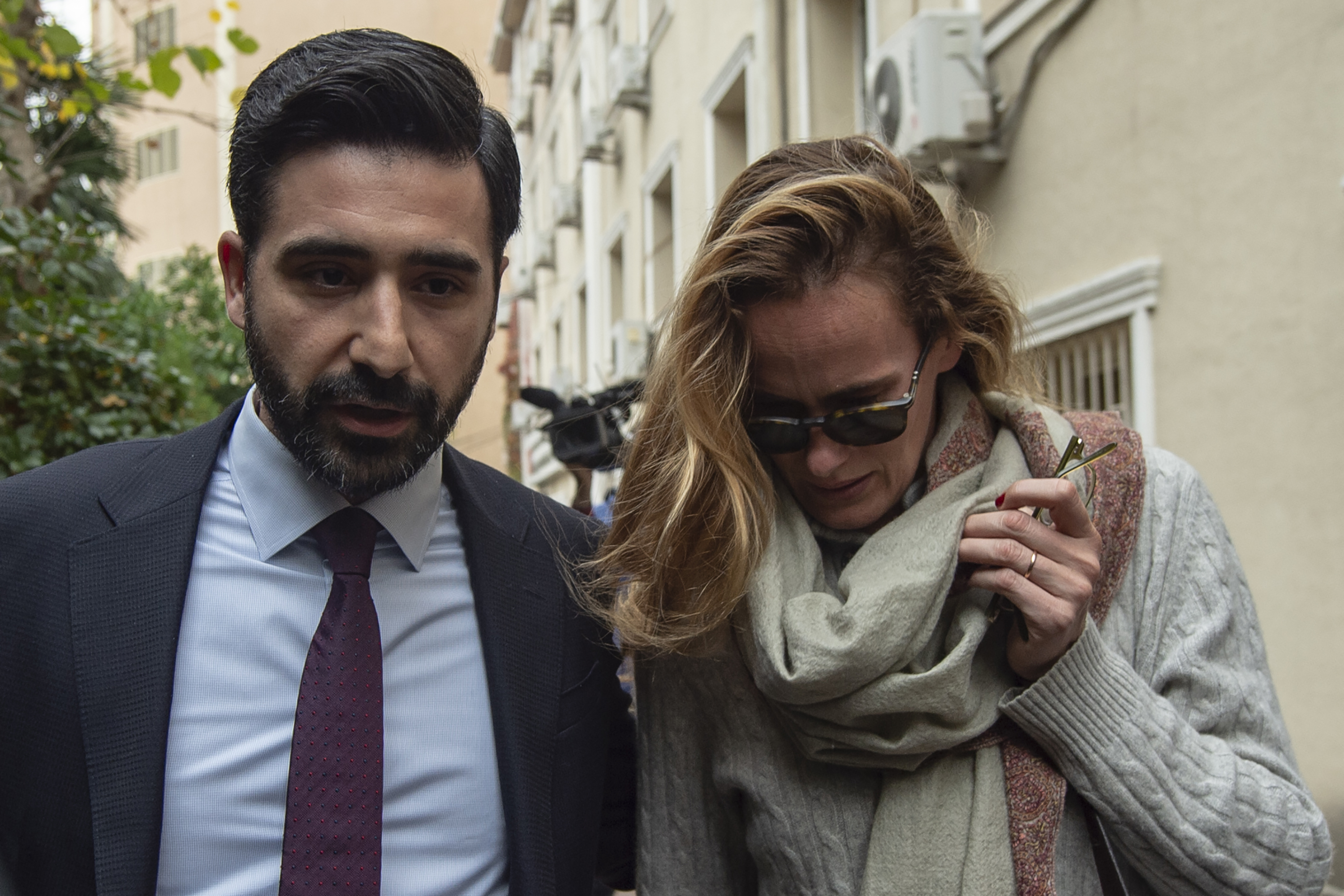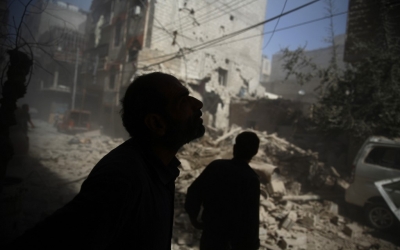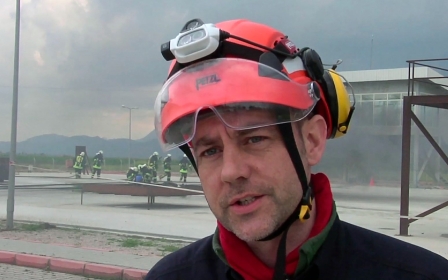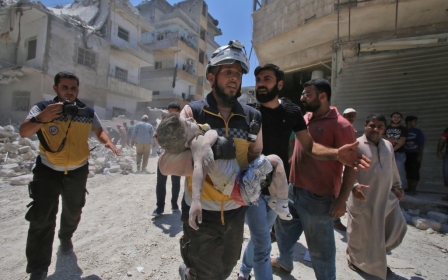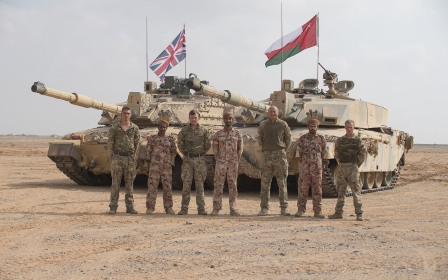Death in Istanbul: James Le Mesurier and Syria’s media war
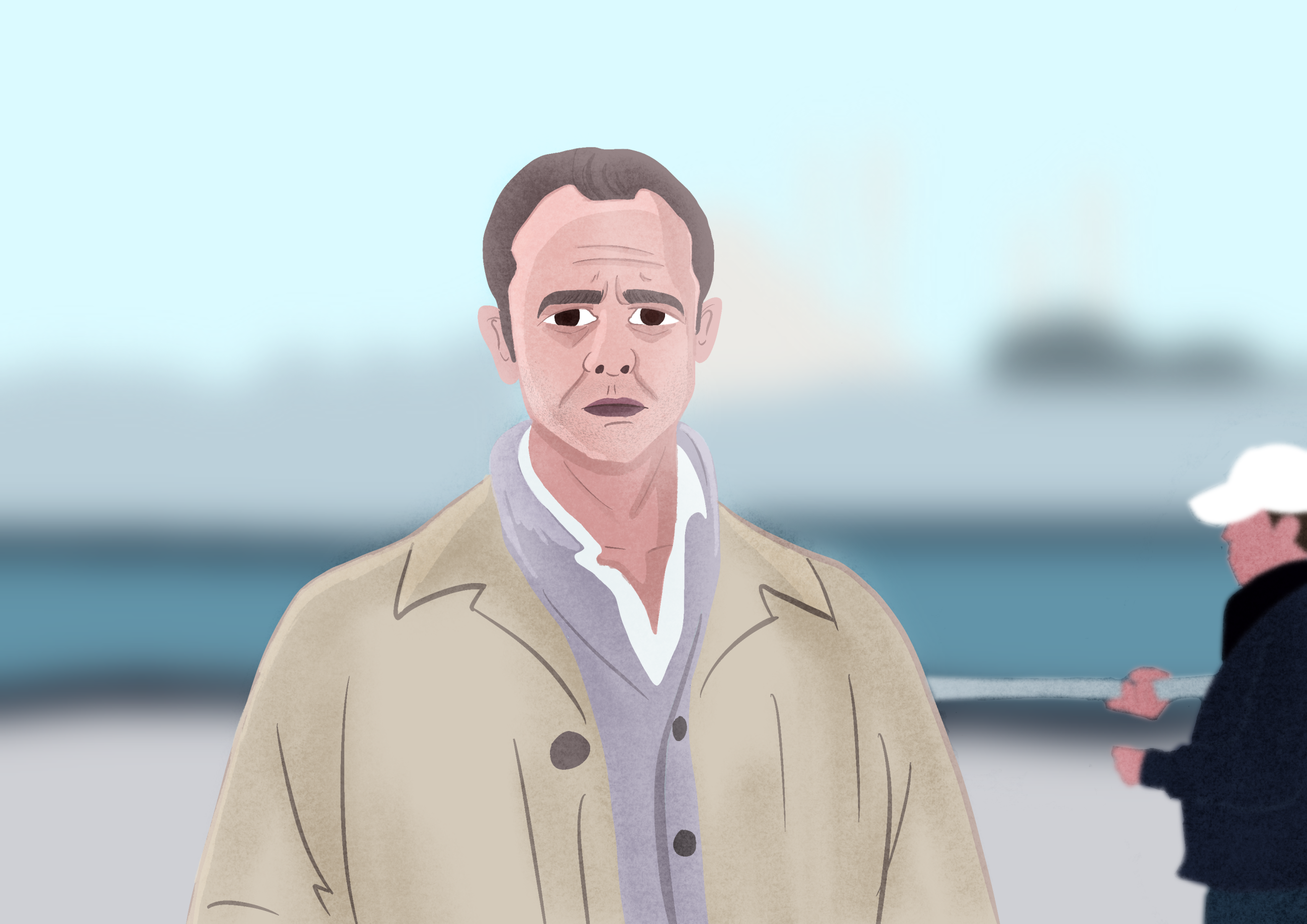
James Le Mesurier's body was found on the street below his Istanbul apartment in the early hours of 11 November 2019. In his shocking death, he ensured that his central role in the Syria conflict’s information and propaganda wars would remain contested long after his fatal fall.
A new BBC Radio 4 investigation of how he built western support for the White Helmets group in Syria’s brutal war brings new light to the mystery, and perhaps offers some answers to the polarised narratives surrounding the cause he supported.
The programme Mayday, by BBC reporter Chloe Hadjimatheou, part of the Intrigue series of podcasts, relies heavily on the account of his third wife and widow Emma Winberg, while also interviewing other senior staff at Mayday, the organisation that funded the rescue group based in opposition-held areas of Syria.
Le Mesurier’s profile as a Sandhurst graduate and suave, somewhat troubled English adventurer not surprisingly makes him easily cast as a real-life James Bond figure.
Rejected by MI6
New MEE newsletter: Jerusalem Dispatch
Sign up to get the latest insights and analysis on Israel-Palestine, alongside Turkey Unpacked and other MEE newsletters
In the 1990s he served as a British army officer in Northern Ireland and the Kosovo war, and had all the makings of a recruit for Britain’s military intelligence service, MI6. According to the programme he was turned down by MI6 for not being honest during his recruitment process about smoking a joint. Cynics might say this sounds like a not very convincing cover story for a spy.
Alistair Harris, a former army colleague and founder of UAE-based counter-extremism consultancy Ark, is asked whether it is likely that a promising, talented potential intelligence officer with years of experience would be turned down because he didn’t tell the truth about inhaling. It reaches a dead end.
Regardless, after this apparent rejection, in 2002 Le Mesurier got a job with the UK Foreign and Commonwealth Office in Israel monitoring Palestinian detainees in Jericho under the Palestinian Authority. He remained there until 2004 when he moved to Iraq following the US-UK invasion, where he worked for the US-controlled Iraqi interior ministry, based in a palace in the Baghdad Green Zone.
After his contract came to an end he became involved in private security work for the occupation forces in Iraq and Afghanistan. According to his ex-wife, “it was very logistically focused”, security and guarding work.
There is a warm cuddly tone to the programme in relation to Le Mesurier, with anecdotes about his practical jokes and romantic nature. In his suit, tie and newly polished brogues, his nickname in the Abu Dhabi office of Ark where he worked from 2012 was “Bond”.
Harris, who knew him from their work in Jericho, said that when the Syrian war started, Ark began managing western-funded projects around the conflict, “including one that involved training young teams of Syrian men to act as firefighters, ambulance drivers, rescuers”, teams who would eventually be known as the White Helmets.
Founding Mayday
In 2013 Le Mesurier left Ark and founded Mayday Rescue, specifically to raise funds for the rescuers. Le Mesurier and his team brought in funding for rescuers in rebel-held Aleppo and Idlib, taking people out of the war zone and into Turkey for training.
Most returned to the war zones to act as civil defence teams in rebel areas. Le Mesurier’s innovation was to provide GoPro cameras to the White Helmets to film their operations. This enabled them to capture footage of Russian and Syrian government air strikes and the carnage and chaos that followed.
James Sadri, formerly a campaigner for Greenpeace and recently with anti-Brexit group Led by Donkeys, started the UK-based Syria Campaign. He said Mayday helped show the rescuers’ “everyday acts of heroism”, and showed the truth about the death and devastation caused by air strikes, and specifically barrel bombs dropped from government helicopters.
Sadri helped promote on social media the rescue of a baby from rubble after an attack. It went viral. Le Mesurier went onto the media to describe the 19-hour rescue operation.
As publicity in western media about the White Helmets grew, for some it appeared "a little too slick" and smacked of a well-crafted propaganda operation to push for western intervention in the war.
Further, footage and statements from some volunteers show them clearly identifying with militant groups operating in Idlib and Aleppo. For the websites and activist journalists who questioned the nature of the White Helmets, this was proof enough that they were aligned with Al-Nusra Front, the former al-Qaeda affiliate in Syria.
Labelled a western front
Le Mesurier was not the only ex-British army officer working at Mayday - another, who preferred to remain anonymous, is interviewed during the series. Not surprisingly, Syrian President Bashar al-Assad’s ally Russia was quick to label the White Helmets as a propaganda front for western-backed regime change.
The series confirms that Ark’s humanitarian programmes in Syria were designed to collect intelligence, as explained by a member of Mayday's staff. The White Helmets, like other Ark-funded programmes, was “an information-gathering exercise”. “Even funding for a women’s knitting group could be used for intelligence gathering on what was happening in a particular area, what groups were in control, and so on.”
With their GoPro cameras, the White Helmets gathered hours and hours of valuable footage about government attacks. But this was open-source intelligence rather than the usual "spooks" stuff, according to Mayday. Films and documentaries were made about the group, including Last Men in Aleppo, garnering awards at film festivals.
(The programme makers have done a lot of interviews and one is a zinger: Sean Penn, the actor and anti-war activist, was making a film on Syria and met Le Mesurier. Despite his scepticism, he was won over by Le Mesurier’s calm and persuasive answers.)
Contested narrative
Others were not convinced, however. Activist journalists, some amplified by Russian media, challenged the narrative of the White Helmets and accused them of working hand-in-glove with armed extremist groups and western intelligence.
A whole episode of the programme is devoted to Vanessa Beeley, the most prominent pro-Assad westerner who has visited Syria and made allegations about the White Helmets. She is heard talking about the philanthro-capitalist network behind the West’s “regime change wars”. The programme makers manage to talk to an old friend of hers, but Beeley did not want to be interviewed and in fact published all the questions that the reporter sent her.
The programme charts how some of the actions of the White Helmets provided ample grounds for those who believed they were a propaganda outfit. In the online "mannequin challenge", the White Helmets fabricated a rescue - “initially they are seen not moving, then we have this extraordinary sound track of screams, bombs falling”. It was gold dust for their detractors.
The co-existence of the White Helmets with Islamist rebel groups is explored. The Jihadist Media Monitoring team at the BBC explains that Hay’at Tahrir al Sham (HTS), the hardline group controlling much of Idlib, has portrayed the White Helmets through its media “in a very positive light”.
The BBC’s Chloe Hadjimatheou contacts the HTS press office and they are quick to get back. “They [the White Helmets] are doing what they are doing to help those affected by the brutal war and they go to great lengths to save innocence lives. They don’t work with HTS but any work that supports the revolution HTS stands by and appreciates.”
Another damning link which is refuted by Mayday and the White Helmets is a well-publicised video of White Helmets appearing at an execution by militants in which they immediately pick up the body of the killed man and take him away.
Chemical attacks
One of the most persistent claims against the White Helmets had been that it was involved in faking chemical attacks in order to spark US strikes against Damascus. These claims are explored, but the substance of the dispute - particularly around the chemical weapons inspectors’ report into the alleged Douma attack of 2018 - remains contested.
Le Mesurier can be seen as one in a line of figures in Britain’s long involvement with the Middle East, from Lawrence of Arabia, to Gertrude Bell in Iraq, to “White Sultan” Timothy Landon in Oman
The episode on the 2017 Khan Sheikhoun chemical attack is deeply upsetting, with accounts of the deaths of children through sarin gas inhalation.
The programme interviews former British ambassador to Syria Peter Ford, who says the British Foreign Office is "cold and calculating" in the way it sees the White Helmets, with all its humanitarian efforts, as a useful propaganda tool. (Ford is co-chair of the British Syrian Society, which was founded by the father-in-law of President Assad.)
As the war ground on, the position of the group became increasingly precarious. The programme covers the removal of hundreds of White Helmets from Syria via Israel in a coordinated operation between the UK, Canada, US and Israel in 2018. Le Mesurier’s fiancee - also a Mayday director by this time - organised their wedding with high-level political guests from funder states to ensure the exit operation was pulled off.
Only 400 White Helmets made it through. Many of those who didn’t are now in jail. The whole organisation was now seen as directly connected to Israel “and the hidden hand of Zionism was seen behind everything they had ever done”.
Fatal mistake
Then Le Mesurier made a fatal mistake. While in Jordan he took $50,000 from the Mayday account for expenses - he spent $12,000 but took the rest to Istanbul and submitted a false receipt. This was an act of panic, according to Winberg.
Le Mesurier’s very presence within the White Helmets story saw him exposed as a servant of British geopolitical interests in the region, undermining the narrative of a volunteer group saving lives in a war zone
The Syrian leader of the White Helmets, Raed Salah, is interviewed, and described as a pensive figure in a bare white office. He is at pains to state that rescuers in opposition areas were up and running before Le Mesurier became involved and brought millions in western funding and logistical support. He says there was “specific tension” about Le Mesurier’s public role as a founder of the White Helmets, which had become a key propaganda point in Russian claims that they were a western front organisation.
Le Mesurier had brought in $140m since 2014 but his presence as the public face and founder was problematic - “his military past, his work for intelligence companies in the Middle East, his posh white Britishness”, all gave his detractors material to critique the organisation.
Farouq Habib, a senior staff member at Mayday, said: “The problem is because we collect evidence that will be used against these murderers - I am sure the Russians would try to destroy the credibility of any person trying to help us.”
Financial misdemeanour
In the end the programme shows his downfall was not due to the various alleged plots against him, but because of lax financial management that saw him accused of putting his hand in the organisational till. (There were other accusations of misuse of funds. Winberg says she took out a temporary loan for their wedding.)
Le Mesurier explained the situation to colleagues, but it led to a growing suspicion of his actions, undermining the confidence of its funders. Johan Eleveld, the finance manager, warned that Le Mesurier could face jail for financial misconduct. A forensic financial audit was ordered on a request from the UK’s Department for International Development. For Le Mesurier personally, it was a catastrophe.
The pressure of the accusations, the smears against him and the damage done to the organisation led to a downward spiral. After a visit to a hospital where he was prescribed medication, Le Mesurier returned with Emma to their Istanbul flat. The next morning he was found dead on the street outside the building.
Too late
Too late for Le Mesurier, the forensic accounting investigation by Grant Thornton, delivered in May 2020, found no evidence of misappropriation. However the auditors' report said they “had to reconstruct a number of financial events and are unable to provide certainty in those cases”. By then western funding had been pulled and Mayday was wound up shortly after. (The US and Canada had began direct funding to the White Helmets in 2019.)
Le Mesurier can be seen as one in a line of figures in Britain’s long involvement with the Middle East, from Lawrence of Arabia, to Gertrude Bell in Iraq, to “White Sultan” Timothy Landon, who helped Oman’s Sultan Qaboos seize power and fight a communist insurgency. Le Mesurier's work with the White Helmets was of a piece with his career as a British soldier and as a privateer involved in the Anglo-American forever wars in the Middle East.
The series does its best to present a sympathetic portrait of a persuasive, well-connected “posh white man” who saw himself as a conduit for a noble mission but ultimately fell foul of the bitter media war he was inescapably part of. Clocking in at around five hours it also exhaustively attempts to answer all the critics of Le Mesurier and the White Helmets and at times feels like the authorised history.
Le Mesurier’s very presence within the White Helmets story saw him exposed as a servant of British geopolitical interests in the region, undermining the narrative of a volunteer group saving lives in a war zone.
The views expressed in this article belong to the author and do not necessarily reflect the editorial policy of Middle East Eye.
Middle East Eye delivers independent and unrivalled coverage and analysis of the Middle East, North Africa and beyond. To learn more about republishing this content and the associated fees, please fill out this form. More about MEE can be found here.



